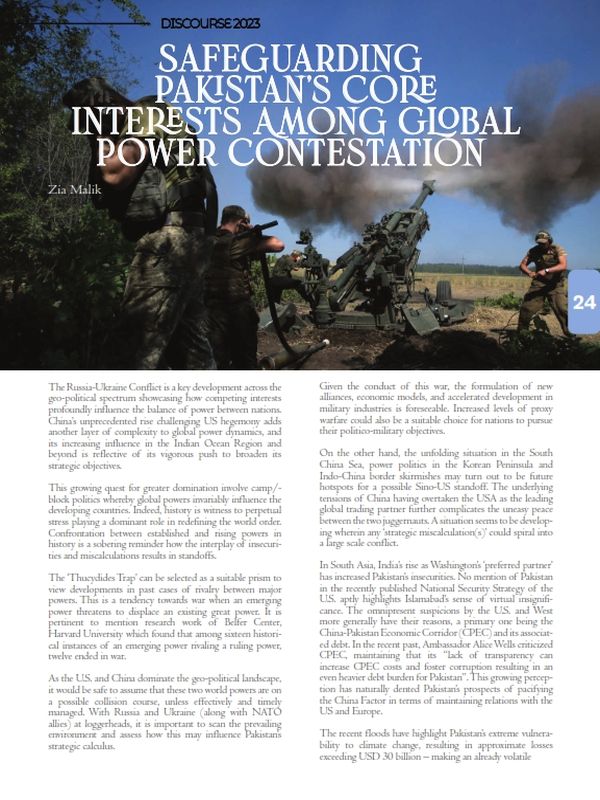Safeguarding Pakistan’s Core Interests Among Global Power Contestation
The Russia-Ukraine Conflict is a key development across the geo-political spectrum showcasing how competing interests profoundly influence the balance of power between nations. China’s unprecedented rise challenging US hegemony adds another layer of complexity to global power dynamics, and its increasing influence in the Indian Ocean Region and beyond is reflective of its vigorous push to broaden its strategic objectives.
This growing quest for greater domination involve camp/block politics whereby global powers invariably influence the developing countries. Indeed, history is witness to perpetual stress playing a dominant role in redefining the world order. Confrontation between established and rising powers in history is a sobering reminder how the interplay of insecurities and miscalculations results in standoffs.
The ‘Thucydides Trap’ can be selected as a suitable prism to view developments in past cases of rivalry between major powers. This is a tendency towards war when an emerging power threatens to displace an existing great power. It is pertinent to mention research work of Belfer Center, Harvard University which found that among sixteen historical instances of an emerging power rivaling a ruling power, twelve ended in war.
As the U.S. and China dominate the geo-political landscape, it would be safe to assume that these two world powers are on a possible collision course, unless effectively and timely managed. With Russia and Ukraine (along with NATO allies) at loggerheads, it is important to scan the prevailing environment and assess how this may influence Pakistan’s strategic calculus.
Given the conduct of this war, the formulation of new alliances, economic models, and accelerated development in military industries is foreseeable. Increased levels of proxy warfare could also be a suitable choice for nations to pursue their politico-military objectives.
On the other hand, the unfolding situation in the South China Sea, power politics in the Korean Peninsula and Indo-China border skirmishes may turn out to be future hotspots for a possible Sino-US standoff. The underlying tensions of China having overtaken the USA as the leading global trading partner further complicates the uneasy peace between the two juggernauts. A situation seems to be developing wherein any ‘strategic miscalculation(s)’ could spiral into a large scale conflict.
In South Asia, India’s rise as Washington’s ‘preferred partner’ has increased Pakistan’s insecurities. No mention of Pakistan in the recently published National Security Strategy of the U.S. aptly highlights Islamabad’s sense of virtual insignificance. The omnipresent suspicions by the U.S. and West more generally have their reasons, a primary one being the China-Pakistan Economic Corridor (CPEC) and its associated debt. In the recent past, Ambassador Alice Wells criticized CPEC, maintaining that its “lack of transparency can increase CPEC costs and foster corruption resulting in an even heavier debt burden for Pakistan”. This growing perception has naturally dented Pakistan’s prospects of pacifying the China Factor in terms of maintaining relations with the US and Europe.
The recent floods have highlight Pakistan’s extreme vulnerability to climate change, resulting in approximate losses exceeding USD 30 billion – making an already volatile volatile economic situation much worse. The overhung of financial mismanagement and political bickering also limits Pakistan’s choices as it undertakes foreign policy ventures amidst this distinctive juncture in global power competition. As Pakistan scrambles to rehabilitate the victims of the calamity, a comprehensive ‘Charter of Economy’ may be necessary for its economic revival: a plan that is geared around debt management, reinvigorating foreign direct investments, broadening the tax base and enhancing public-private partnerships in key sectors.
Pakistan should focus on Realpolitik to align itself with the evolving geopolitical environment, at the heart of which will be its core economic interests. Maintaining balanced foreign relations, policy makers in Islamabad need to be cognizant of the fact that its bilateral trade with the U.S. and China volumes around USD 7 billion and USD 16 billion respectively.
Pakistan must make concerted efforts to dispel speculations around CPEC, demonstrating to the world that Chinese investments that are coming in are purely for development and economic endeavors. By ensuring more scrutiny of CPEC projects and involvement of the private sector in special economic zones (SEZs), a heightened sense of transparency may prevail in these undertakings.
Pakistan may also focus on enhancing regional connectivity under the purview of CPEC. While belt and road (BRI) projects are already expanding in other South Asian nations around the Indian periphery, exploring possible options in Afghanistan would enable Pakistan to placate US apprehensions about CPEC.
Basing connectivity with Central Asian Republics (CARs) as a pretext, Pakistan can help project the CPEC as a regional connectivity corridor. After all, basing connectivity as part of the North South Transit Corridor (NSTC) was how India avoided U.S. sanctions and developed Chahbahar port and associated infrastructure in the Iranian hinterland – something Pakistan can learn from.
In the regional economic domain, increasing trade with Afghanistan, accelerated progress on the Turkmenistan-Afghanistan-Pakistan-India (TAPI) gas pipeline and the Central Asia-South Asia (CASA-1000) power project, and finalizing modalities on potential barter trade with Iran are some major areas where a multipronged effort can significantly benefit Pakistan in the long run.
A synergized effort to pursue national interests naturally demands vigorous strategic communication. An effective and measured response in the information domain is earnestly required as a critical strand in Pakistani statecraft. This calls for narrative building through via an increased presence in foreign media for preempting and quelling all hostile perspectives unleashed by our principle adversary.
To summarize, the rapidly evolving global political milieu represents a critical moment as the balance of power morphs towards a bloc centric multipolar world. Latest developments across the Ukrainian battlefield and the deepening Sino-US rivalry points towards gathering storms, underscoring the need for Pakistan to develop a well thought-out response.
An emphasis on economic revival, combined with a balanced and independent foreign policy (in terms of conception and execution) can greatly help Pakistan overcome the intricacies of this ongoing global power contestation.
The author is an MS Scholar at SZABIST, Islamabad. He can be reached at [email protected].




